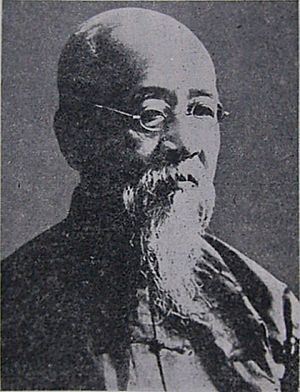Luo Zhenyu facts for kids
Quick facts for kids
Luo Zhenyu
羅振玉 |
|
|---|---|

Luo Zhenyu
|
|
| Born | 8 August 1866 Huai'an, Jiangsu, Qing China
|
| Died | 14 May 1940 (aged 73) Dalian, Kwantung Leased Territory
|
| Citizenship | China, Manchukuo |
| Luo Zhenyu | |||||||||
|---|---|---|---|---|---|---|---|---|---|
| Chinese | 罗振玉 | ||||||||
| Traditional Chinese | 羅振玉 | ||||||||
|
|||||||||
Luo Zhenyu (born August 8, 1866 – died May 14, 1940) was a very important Chinese scholar. He was known for studying ancient languages, old writings, and historical objects. He helped us understand a lot about China's past.
Contents
Luo Zhenyu's Life and Discoveries
Luo Zhenyu was born in a place called Huai'an in China. After a big war called the First Sino-Japanese War, he started publishing books about farming in Shanghai.
Early Education and Travels
In 1896, Luo Zhenyu and his friends started a school to teach Japanese language. One of his famous students was a scholar named Wang Guowei. In 1901, Luo Zhenyu visited Japan to learn about their education system.
From 1906, he worked in different government jobs, often related to farming. He was even the head of the Imperial Agricultural College for a few years.
A Time of Change and Research
Luo Zhenyu was very loyal to the Qing dynasty, which was the ruling family at the time. When the Xinhai Revolution happened and the Qing dynasty ended, he moved to Japan. There, he lived in Kyoto and studied Chinese archaeology, which is the study of human history through digging up old things.
In 1919, he returned to China and settled in Tianjin. He became involved in efforts to bring back the last Qing Emperor, Puyi, to power. Luo Zhenyu became one of Emperor Puyi's most trusted advisors.
Later Years and Scholarly Work
Later, a new state called Manchukuo was created by Japan in 1932. Luo Zhenyu took a job in this new government from 1933 to 1938. He wanted Manchukuo to remain a monarchy, meaning it would be ruled by a king or emperor. He also worked to improve cultural ties between Japan and Manchukuo.
However, Luo Zhenyu became unhappy with how the Japanese army controlled things. He felt that Emperor Puyi didn't have real power. So, he resigned from his positions in 1938 and retired to Dalian.
Uncovering Ancient Chinese Secrets
Even with his political activities, Luo Zhenyu's biggest achievements were as a scholar. He spent his life working to save and study old Chinese items. These included oracle bones, which are animal bones or turtle shells with ancient Chinese writing on them. He also studied bamboo and wooden slips, which were used for writing before paper. Another important collection he worked with was the Dunhuang manuscripts, ancient documents found in caves. All these materials are super important for understanding ancient China.
Luo Zhenyu was one of the first scholars to figure out the meaning of the oracle bone script. This was a huge step in understanding early Chinese writing. He also wrote many important books about the bronzeware script, which is writing found on ancient bronze objects.
He helped publish Tieyun Canggui by Liu E, which was the first collection of oracle bones. He also helped publish Qiwen Juli by Sun Yirang, which was the first book to explain how to read the oracle bone script. Luo Zhenyu's own book, Yinxu Shuqi Kaoshi, is still a very important work for anyone studying oracle bone script today.
He was also the first modern scholar to be interested in the Tangut script, another ancient writing system. He published several papers about it in 1912 and 1927.
 | Bessie Coleman |
 | Spann Watson |
 | Jill E. Brown |
 | Sherman W. White |

